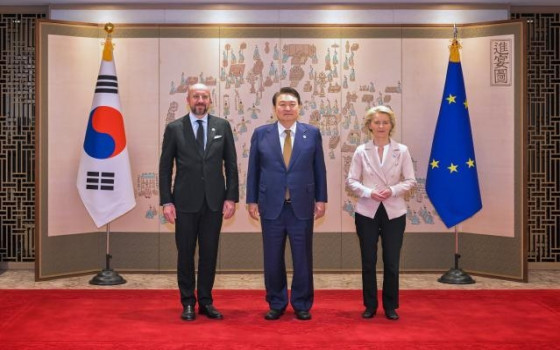
At the conclusion of the EU-South Korea summit .. Van der Leyen: We met to reflect on the future of our partnerships and launched several initiatives Brussels: Europe and the Arabs

- Europe and Arabs
- Monday , 22 May 2023 19:46 PM GMT
Brussels: Europe and the Arabs
During the joint press conference held with the President of the European Union, Charles Michel, and the President of South Korea, Yoon Sok Yul, at the conclusion of the joint summit in Seoul, Ursula von der Leyen, President of the European Commission, said:
This year indeed marks an important milestone for us - the 60th anniversary of our bilateral relations. It is really amazing to go back to 1963. The predecessor of the European Union, the so-called European Economic Community, had just been established just six years ago. Barely ten years ago, Korea had emerged from war. However, the partnership has evolved and blossomed into one of our deepest and richest, and was elevated to the status of a strategic partnership in 2010. It was completed by one of the most important free trade agreements the European Union has ever signed. After one year. One made fantastically for both sides.
I mention this because the investment we have made in this relationship has never been more important and valuable than it is today, in a world that has been deeply shaken by Russia's war of aggression in Ukraine, and Russia's flagrant violation of the UN Charter and international law. I have condemned this war of aggression from the very beginning. You are coordinating tough sanctions against Russia's war economy with us and other international partners. And you are channeling much-needed financial and humanitarian assistance to Ukraine and its people. All this to your credit account. And it shows again the strength of our bond. Two democracies that share the same values and a friendship that defies geographical distances. This is best illustrated by our people who have a long and rich tradition of exchanges, particularly through business, education and culture. Trade figures testify to the dense nature of our relationship with an increase of over 110% thanks to our free trade agreement. A real success that we continue to develop.
Today, we have come together to reflect on the future of our partnership. How do we benefit most from this special bond we share? Part of the answer lies in the discussions we had at the G7 summit. Democracies like ours must get better at handling geopolitical and economic shocks together. We need to ensure our economic security while maintaining our openness and promoting healthy competition among ourselves. So today we launched a number of joint initiatives to do just that.
First, we launched our Green Partnership. We will work to converge our regulations on carbon pricing, deforestation, and plastic products, and explore joint ventures in the areas of renewable energy, energy efficiency, and the hydrogen economy. Second, we are in the process of launching negotiations for Korea to join Horizon Europe, the European Union's research program - and the largest in the world. We will get our brilliant minds working together on the technologies of tomorrow. Third, we are signing an arrangement on health emergency preparedness and response. This also relates to sharing critical information about the state of supply chains. And fourth, we're moving forward with the digital partnership that we agreed on last fall, by having our teams work on AI, for example, high-performance computing, and in particular, semiconductors. I would like to point out here that the EU chip law can be a great boon for Korean investments in semiconductor manufacturing. Finally, we should be able to start negotiations on a digital trade rules agreement even this year. So, this is for our partnership in strategic economic sectors. We also agreed to intensify our cooperation in the fields of security and defence. We will launch a strategic dialogue that spans crisis management, maritime security, cyber security, or counter-terrorism, to name a few.
Finally, I'd like to talk about the broader Indo-Pacific region. In particular, I would like to reiterate the European Union's full solidarity with you in the face of the continuing nuclear threat from the Democratic People's Republic of Korea. The European Union will never accept the possession of nuclear weapons by the Democratic People's Republic of Korea as a matter of course. And just as we do not accept Russia's military aggression against Ukraine, we condemn the DPRK's constant rattling with a nuclear sword. We stand firmly with the Republic of Korea. Finally, we share much consistent visions for the future of this region in general. So we want to work with the Republic of Korea on a positive agenda for the Indo-Pacific. We propose to do this as part of our Global Gateway investment strategy. The global portal is already operating in the region, with an investment package for ASEAN countries.
But we can do more. There are a number of projects with great potential for the region. We discussed transport corridors in Central Asia, digitization in Vietnam, forests in Mongolia - there are many opportunities for cooperation. I hope we can get them off the ground as soon as possible and show our people that democracies can deliver - and they do the best. Indeed, one has only to look at the tremendous success of the Republic of Korea to prove the point. And this despite living under constant conflict, on a peninsula divided into north and south. As a German, I know what it's like to live in a country long divided between East and West. I want to tell you: you will win. The future will eventually come with peaceful unification. Because the yearning for freedom is always stronger than the strength of any dictator.
So thank you again for your warm welcome. I look forward to seeing you at the G-20 summit in New Delhi in September, and at our summit in Brussels next year.












No Comments Found